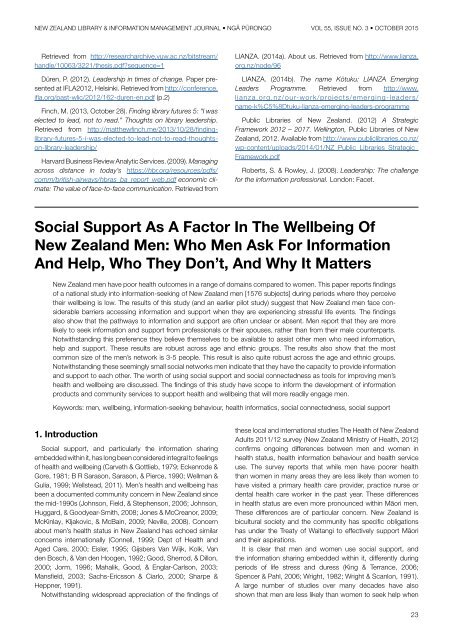THE NEW ZEALAND LIBRARY & INFORMATION MANAGEMENT JOURNAL NGĀ PŪRONGO
NZLIMJ%20Vol%2055%20Issue%203
NZLIMJ%20Vol%2055%20Issue%203
Create successful ePaper yourself
Turn your PDF publications into a flip-book with our unique Google optimized e-Paper software.
<strong>NEW</strong> <strong>ZEALAND</strong> <strong>LIBRARY</strong> & <strong>INFORMATION</strong> <strong>MANAGEMENT</strong> <strong>JOURNAL</strong> • <strong>NGĀ</strong> <strong>PŪRONGO</strong> VOL 55, ISSUE NO. 3 • OCTOBER 2015<br />
Retrieved from http://researcharchive.vuw.ac.nz/bitstream/<br />
handle/10063/3221/thesis.pdf?sequence=1<br />
Düren, P. (2012). Leadership in times of change. Paper presented<br />
at IFLA2012, Helsinki. Retrieved from http://conference.<br />
ifla.org/past-wlic/2012/162-duren-en.pdf (p.2)<br />
Finch, M. (2013, October 28). Finding library futures 5: “I was<br />
elected to lead, not to read.” Thoughts on library leadership.<br />
Retrieved from http://matthewfinch.me/2013/10/28/findinglibrary-futures-5-i-was-elected-to-lead-not-to-read-thoughtson-library-leadership/<br />
Harvard Business Review Analytic Services. (2009). Managing<br />
across distance in today’s https://hbr.org/resources/pdfs/<br />
comm/british-airways/hbras_ba_report_web.pdf economic climate:<br />
The value of face-to-face communication. Retrieved from<br />
LIANZA. (2014a). About us. Retrieved from http://www.lianza.<br />
org.nz/node/96<br />
LIANZA. (2014b). The name Kōtuku: LIANZA Emerging<br />
Leaders Programme. Retrieved from http://www.<br />
lianza.org.nz/our-work/projects/emerging-leaders/<br />
name-k%C5%8Dtuku-lianza-emerging-leaders-programme<br />
Public Libraries of New Zealand. (2012) A Strategic<br />
Framework 2012 – 2017. Wellington, Public Libraries of New<br />
Zealand, 2012. Available from http://www.publiclibraries.co.nz/<br />
wp-content/uploads/2014/01/NZ_Public_Libraries_Strategic_<br />
Framework.pdf<br />
Roberts, S. & Rowley, J. (2008). Leadership: The challenge<br />
for the information professional. London: Facet.<br />
Social Support As A Factor In The Wellbeing Of<br />
New Zealand Men: Who Men Ask For Information<br />
And Help, Who They Don’t, And Why It Matters<br />
New Zealand men have poor health outcomes in a range of domains compared to women. This paper reports findings<br />
of a national study into information-seeking of New Zealand men [1576 subjects] during periods where they perceive<br />
their wellbeing is low. The results of this study (and an earlier pilot study) suggest that New Zealand men face considerable<br />
barriers accessing information and support when they are experiencing stressful life events. The findings<br />
also show that the pathways to information and support are often unclear or absent. Men report that they are more<br />
likely to seek information and support from professionals or their spouses, rather than from their male counterparts.<br />
Notwithstanding this preference they believe themselves to be available to assist other men who need information,<br />
help and support. These results are robust across age and ethnic groups. The results also show that the most<br />
common size of the men’s network is 3-5 people. This result is also quite robust across the age and ethnic groups.<br />
Notwithstanding these seemingly small social networks men indicate that they have the capacity to provide information<br />
and support to each other. The worth of using social support and social connectedness as tools for improving men’s<br />
health and wellbeing are discussed. The findings of this study have scope to inform the development of information<br />
products and community services to support health and wellbeing that will more readily engage men.<br />
Keywords: men, wellbeing, information-seeking behaviour, health informatics, social connectedness, social support<br />
1. Introduction<br />
Social support, and particularly the information sharing<br />
embedded within it, has long been considered integral to feelings<br />
of health and wellbeing (Carveth & Gottlieb, 1979; Eckenrode &<br />
Gore, 1981; B R Sarason, Sarason, & Pierce, 1990; Wellman &<br />
Gulia, 1999; Wellstead, 2011). Men’s health and wellbeing has<br />
been a documented community concern in New Zealand since<br />
the mid-1990s (Johnson, Field, & Stephenson, 2006; Johnson,<br />
Huggard, & Goodyear-Smith, 2008; Jones & McCreanor, 2009;<br />
McKinlay, Kljakovic, & McBain, 2009; Neville, 2008). Concern<br />
about men’s health status in New Zealand has echoed similar<br />
concerns internationally (Connell, 1999; Dept of Health and<br />
Aged Care, 2000; Eisler, 1995; Gijsbers Van Wijk, Kolk, Van<br />
den Bosch, & Van den Hoogen, 1992; Good, Sherrod, & Dillon,<br />
2000; Jorm, 1996; Mahalik, Good, & Englar-Carlson, 2003;<br />
Mansfield, 2003; Sachs-Ericsson & Ciarlo, 2000; Sharpe &<br />
Heppner, 1991).<br />
Notwithstanding widespread appreciation of the findings of<br />
these local and international studies The Health of New Zealand<br />
Adults 2011/12 survey (New Zealand Ministry of Health, 2012)<br />
confirms ongoing differences between men and women in<br />
health status, health information behaviour and health service<br />
use. The survey reports that while men have poorer health<br />
than women in many areas they are less likely than women to<br />
have visited a primary health care provider, practice nurse or<br />
dental health care worker in the past year. These differences<br />
in health status are even more pronounced within Māori men.<br />
These differences are of particular concern. New Zealand is<br />
bicultural society and the community has specific obligations<br />
has under the Treaty of Waitangi to effectively support Māori<br />
and their aspirations.<br />
It is clear that men and women use social support, and<br />
the information sharing embedded within it, differently during<br />
periods of life stress and duress (King & Terrance, 2006;<br />
Spencer & Pahl, 2006; Wright, 1982; Wright & Scanlon, 1991).<br />
A large number of studies over many decades have also<br />
shown that men are less likely than women to seek help when<br />
23


